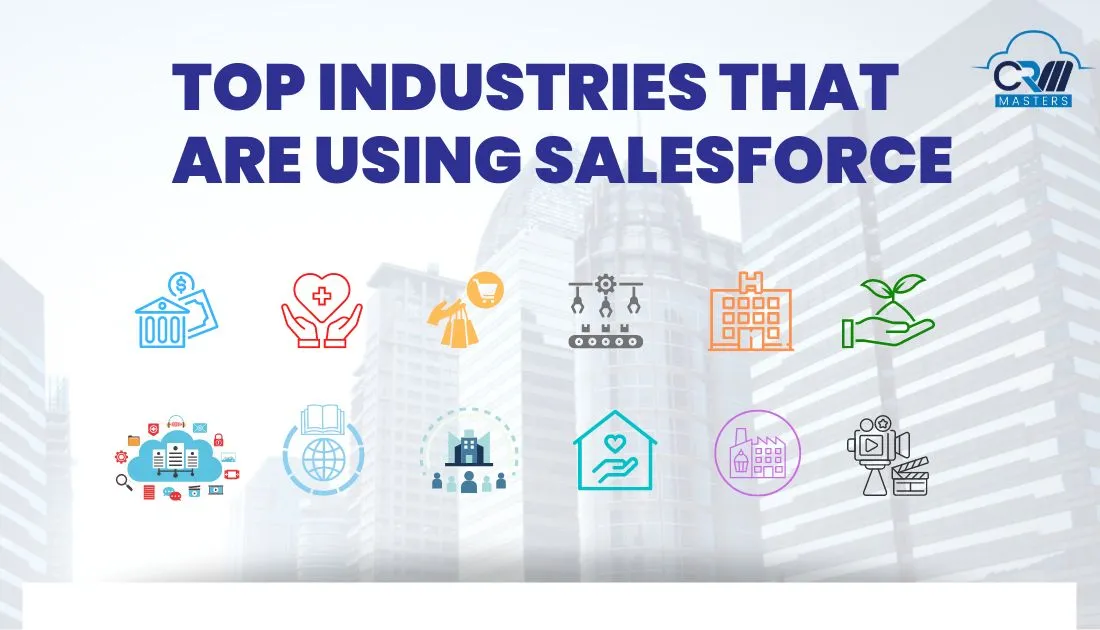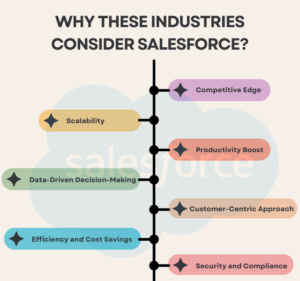
Which Industries can use Salesforce?
In today’s digitally-driven world, businesses across various industries are constantly seeking innovative ways to enhance customer relationships, streamline operations, and drive growth. Salesforce, a powerful customer relationship management (CRM) platform, has emerged as a game-changer for organizations looking to achieve these goals. With its flexibility, scalability, and wide range of features, Salesforce is not limited to any single industry. In fact, it has found its place in a multitude of sectors, offering tailored solutions to meet unique industry needs.
One of the most widely used cloud-based customer relationship management (CRM) systems is Salesforce CRM. Numerous businesses, including small businesses, medium-sized organizations, and huge corporations, use it. Organizations in the technology, retail, insurance, banking, and industrial industries are particularly fond of Salesforce CRM.
In this blog, we’ll explore the diverse range of which industries can use Salesforce for their business that can harness the power of Salesforce to transform their operations and elevate customer experiences.
1. Retail and E-Commerce: Revolutionizing Customer Engagement
The retail and e-commerce industry thrives on understanding and satisfying customer demands. Salesforce’s CRM capabilities enable businesses to capture, analyze, and leverage customer data to create personalized shopping experiences. With Salesforce, retailers can implement data-driven marketing strategies, optimize inventory management, and provide seamless omnichannel customer support. By using Salesforce Commerce Cloud, companies can build robust e-commerce websites, ensuring a user-friendly interface and smooth shopping experiences.
2. Financial Services: Enhancing Client Relationships
The financial services sector demands rigorous data management, compliance, and personalized client interactions. Salesforce’s Financial Services Cloud is tailored to meet these requirements, providing tools for managing client relationships, tracking financial goals, and ensuring regulatory compliance. Financial institutions can use Salesforce to create a 360-degree view of each client, facilitating better advisory services and improving customer trust.
3. Healthcare: Improving Patient Care and Engagement
Salesforce has made significant inroads into the healthcare industry by offering solutions that improve patient care and engagement. With Health Cloud, healthcare providers can centralize patient data, streamline appointment scheduling, and provide personalized treatment plans. Additionally, Salesforce’s Marketing Cloud can be used to create targeted health campaigns, keeping patients informed and engaged in their healthcare journeys.
4. Manufacturing: Optimizing Operations
Manufacturers can leverage Salesforce to optimize their operations and enhance collaboration. Salesforce’s Manufacturing Cloud allows organizations to gain real-time visibility into their supply chains, manage production processes efficiently, and forecast demand more accurately. This, in turn, leads to improved inventory management, reduced production costs, and higher customer satisfaction.
5. Education: Empowering Learning Institutions
Educational institutions, from K-12 schools to universities, can benefit from Salesforce’s Education Cloud. This platform assists in student recruitment, enrollment management, and alumni engagement. Salesforce’s analytics capabilities help educational institutions gain insights into student performance and make data-driven decisions to improve academic outcomes.
6. Nonprofits: Driving Social Impact
Salesforce’s Nonprofit Cloud is designed to empower organizations dedicated to driving social change. Nonprofits can use Salesforce to manage donor relationships, track donations, and measure the impact of their programs. This CRM platform enables nonprofits to operate more efficiently, allocate resources effectively, and engage with their communities to create lasting positive change.
7. Hospitality and Travel: Enhancing Guest Experiences
The hospitality and travel industry relies on providing exceptional guest experiences. Salesforce Hospitality Cloud enables hotels, airlines, and travel agencies to personalize guest interactions, streamline reservations, and offer tailored recommendations. By harnessing the power of data, businesses in this industry can boost customer loyalty and revenue.
8. Professional Services: Managing Client Relationships
Professional services firms, such as consulting and legal firms, rely on strong client relationships. Salesforce helps these organizations manage client data, track project progress, and ensure efficient service delivery. With the Salesforce platform, professional services firms can enhance collaboration among their teams and improve client satisfaction.
9. Real Estate: Streamlining Property Management
The real estate industry faces constant challenges in managing properties, clients, and transactions. Salesforce’s Real Estate Cloud offers a comprehensive solution for property management, lead generation, and customer relationship management. Real estate professionals can use Salesforce to automate workflows, manage listings, and provide clients with up-to-date information on properties.
10. Government: Enhancing Citizen Services
Governments at various levels can utilize Salesforce to improve citizen services and engagement. Salesforce Government Cloud helps public sector organizations modernize their operations, from case management to citizen engagement. This enables governments to provide more efficient and transparent services to their constituents.
Why Do These Industries Consider Salesforce?
With an understanding of which industries can benefit from Salesforce, let’s explore why businesses of all sizes and types should consider adopting this powerful CRM platform:

Competitive Edge: Salesforce equips businesses with the tools needed to gain a competitive advantage by improving customer experiences, streamlining operations, and facilitating data-driven decision-making.
Scalability: Salesforce grows with your business, ensuring that it remains a valuable asset as your organization expands.
Productivity Boost: Automation of repetitive tasks and streamlined workflows enhances overall productivity, allowing employees to focus on strategic initiatives.
Data-Driven Decision-Making: Salesforce’s robust analytics and reporting capabilities provide actionable insights, enabling organizations to make informed decisions that drive growth.
Customer-Centric Approach: Salesforce helps organizations build stronger customer relationships by providing a 360-degree view of customer data, enabling personalized interactions and improved customer service.
Efficiency and Cost Savings: Automation and process optimization result in operational efficiency and cost savings over time.
Security and Compliance: Salesforce places a strong emphasis on data security and compliance, making it suitable for industries with stringent regulatory requirements.
Key Features of Salesforce
Before delving into industry-specific applications, let’s first explore some key features that make Salesforce an attractive CRM solution:
Contact and Lead Management: Salesforce provides a centralized database for storing and managing customer information, making it easy to track interactions and engagement.
Opportunity Management: Users can efficiently track sales opportunities, helping sales teams prioritize leads and close deals effectively.
Workflow Automation: Salesforce enables businesses to automate repetitive tasks, reducing manual effort and minimizing errors.
Analytics and Reporting: Robust analytics tools allow organizations to gain insights into data, track key performance metrics, and make data-driven decisions.
Customization: Salesforce is highly customizable, allowing businesses to adapt the platform to their unique processes and requirements.
Integration Capabilities: The platform seamlessly integrates with a wide range of third-party applications, creating a connected ecosystem that enhances productivity.
Artificial Intelligence (AI): Salesforce’s AI-driven features, such as Einstein Analytics, offer predictive analytics and automation, helping organizations anticipate customer needs and streamline operations.
Conclusion
Salesforce is not only limited to just a CRM platform, it is a versatile tool that is used by various industries nowadays and provides benefits & industry-specific solutions. If you are looking for assistance, CRM Masters Infotech as a Certified Salesforce Consultant can help you with this. Salesforce can be the catalyst for success and transformation in your business. Contact us today and drive growth in today’s digital world.












